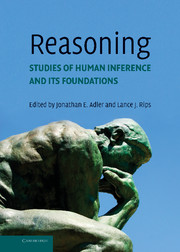Book contents
- Frontmatter
- Contents
- Preface
- List of Contributors
- Introduction: Philosophical Foundations
- PART I FOUNDATIONS OF REASONING
- PART II MODES OF REASONING
- PART II INTERACTIONS OF REASONING IN HUMAN THOUGHT
- Section 9 Reasoning and Pragmatics
- 35 Specificationism
- 36 Presupposition, Attention, and Why-Questions
- 37 Further Notes on Logic and Conversation
- 38 The Social Context of Reasoning: Conversational Inference and Rational Judgment
- Section 10 Domain-Specific, Goal-Based, and Evolutionary Approaches
- Section 11 Reasoning and Cultures
- Section 12 Biology, Emotions, and Reasoning
- Index
- References
35 - Specificationism
Published online by Cambridge University Press: 05 June 2012
- Frontmatter
- Contents
- Preface
- List of Contributors
- Introduction: Philosophical Foundations
- PART I FOUNDATIONS OF REASONING
- PART II MODES OF REASONING
- PART II INTERACTIONS OF REASONING IN HUMAN THOUGHT
- Section 9 Reasoning and Pragmatics
- 35 Specificationism
- 36 Presupposition, Attention, and Why-Questions
- 37 Further Notes on Logic and Conversation
- 38 The Social Context of Reasoning: Conversational Inference and Rational Judgment
- Section 10 Domain-Specific, Goal-Based, and Evolutionary Approaches
- Section 11 Reasoning and Cultures
- Section 12 Biology, Emotions, and Reasoning
- Index
- References
Summary
During the 1970s and 1980s, various French government bodies, along with their primary contractor, Matra Transport, invested on the order of half a billion francs in a futuristic guided transportation system called Aramis.
Aramis was … the niftiest of all, it was the programmed metro seat. The traveler merely goes to the station. He sits down, punches in the program, and opens up his newspaper. When the thing stops, he looks up, puts away his paper, and there he is, where he wanted to go. It's point-to-point, with no connections, no stops at intermediate stations.
The ideal, for passengers, … is what? It's not to think, not to slow down, not to transfer, and to arrive at their destination nevertheless. That's point-to-point transportation. That's Aramis.
Someone who spends a sizable portion of his weekday in rush hour traffic might well respond enthusiastically to such a description: it's a great idea, and we should build it! To which the right answer would be, of course, build what? What we have had described isn't yet a goal that's definite enough for anyone to start taking steps, such as having suppliers bid on a part. You first have to design it, that is, to finish deciding just what it is you want built.
The sort of thought that goes into the design phase of such a project is the specification of an initial, very thin description of a goal, and over the past few decades it has come in for increasing attention on the part of philosophers who work on practical reasoning.
- Type
- Chapter
- Information
- ReasoningStudies of Human Inference and its Foundations, pp. 731 - 747Publisher: Cambridge University PressPrint publication year: 2008
References
- 12
- Cited by



